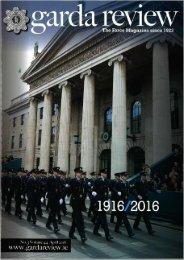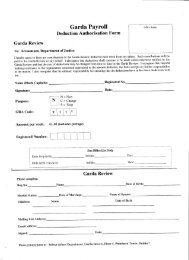Conference Report 2016
Table of contents contains links on page 5. It can be used to skip through chapters.
Table of contents contains links on page 5. It can be used to skip through chapters.
Create successful ePaper yourself
Turn your PDF publications into a flip-book with our unique Google optimized e-Paper software.
Section 1: Pay and Allowances<br />
and our members’ economic and social<br />
development. This discriminatory exclusion<br />
prevailed over the 1971-82 National Wage<br />
Agreement and again over the 1987-2007 Social<br />
Partnership era and has persisted. It constitutes<br />
one of the root causes of deep-seated frustration<br />
and anger among our members.<br />
Involuntary Overtime and unsocial hours<br />
3.56 There is an obligation on the Association’s members<br />
to discharge their duties on the basis of overtime<br />
arrangements on pain of penalty on the direction of<br />
either a superior officer or other external source<br />
(e.g. the judiciary). In effect gardaí have been<br />
traditionally subject, obliged or directed to work an<br />
inordinate amount of overtime and unsocial hours.<br />
Members cannot refuse to respond to such<br />
directives.<br />
3.57 This gives rise to an inappropriate and inequitable<br />
imposition of the pension levy payment for the<br />
Garda rank. The catchall application fails to take the<br />
compulsory component into account; in stark<br />
contrast with the majority of other employments<br />
where overtime is optional. Furthermore, unlike<br />
employment or work arrangements affecting the<br />
national workforce, members of An Garda Síochána<br />
are obliged to work unsocial hours.<br />
3.58 While some other employments entail an element of<br />
unsocial hours working, every effort is made to<br />
minimise the extent e.g. in the Prison Service by<br />
releasing some prisoners at Christmas, in the health<br />
sector discharging patients at Christmas. In<br />
contrast, Christmas Day is becoming particularly<br />
busy for gardaí, with many citizens utilising the<br />
Force as one of the few agencies available to them<br />
for general assistance; not always directly<br />
associated with policing.<br />
PART fOuR: INDuSTRIAl STRIfE<br />
4.1 In the lead up to the signing of the Haddington Road<br />
Agreement the GRA expressed concern that<br />
individual members did not put themselves beyond<br />
the law. Actions were taken by individual gardaí,<br />
starting with the withdrawal of the voluntary use of<br />
personal equipment, followed by a refusal to<br />
volunteer for overtime and subsequently via the<br />
treatment of motor tax offences. However, the staff<br />
associations prudently avoided directing or<br />
encouraging members to engage in such actions,<br />
though the pressure thereon was overwhelming.<br />
4.2 This Association, despite being sidelined from key<br />
and consequential decision making processes has<br />
always been mindful of the potential damage<br />
associated with industrial action to the public<br />
standing of the force. That noted, there are<br />
occasions when the Association cannot contain the<br />
members’ anger and some limited forms of<br />
industrial action have been necessitated (the ‘Blue<br />
Flu’ in 1998, the PULSE boycott in 1999).<br />
4.3 The anger that prompted these actions has<br />
resurfaced sporadically in the Association’s<br />
membership and is detrimental to the morale of the<br />
Force; so important in police and the military as a<br />
unifying energy to create the pride, enthusiasm and<br />
vigour are key factors in motivation and productivity.<br />
There is no efficient definition or measurement for<br />
morale and it is only measurable in its absence.<br />
4.4 The status and the morale of the Garda rank are at<br />
‘an all-time low’. Whenever politicians refute this,<br />
they do so without tangible evidence. For a Force<br />
the size of An Garda Síochána a sample size of<br />
1,000 would be required in any survey to give a<br />
robust indicator; something that no government has<br />
been prepared to sanction. The morale slump is also<br />
attributable to declining rank numbers, depreciating<br />
equipment, reduced resources, rising levels of<br />
assault on on-duty gardaí (some 1,000 per annum<br />
and underreported) and to the financial predicament<br />
being faced by many junior gardaí with substantial<br />
mortgages.<br />
4.5 A related disconcerting feature of the vulnerable<br />
and exploited position that the Garda rank now finds<br />
itself in is that arguably its most important asset,<br />
the trust and support of the public, has experienced<br />
a worrisome downturn since the management and<br />
oversight controversies throughout 2014; including<br />
the allegations made by garda whistleblowers and<br />
the fallout from the Cooke, Guerin and Fennelly<br />
reports.<br />
PART fIVE: PAy, CONDITIONS AND<br />
AllOwANCES<br />
5.1 Remuneration systems are the focus of persistent<br />
scrutiny by employees, as they provide the means<br />
to satisfy basic needs, and also allow satisfaction of<br />
less tangible desires for personal growth and<br />
satisfaction. The payment system is the key to the<br />
provision of the means to live and achieve other<br />
personal and family goals. The weekly or monthly<br />
fund transfer is typically the single major source of<br />
personal income for the employee and as a result<br />
38th Annual Delegate <strong>Conference</strong><br />
31




